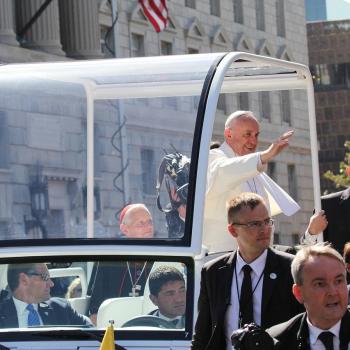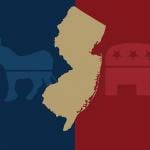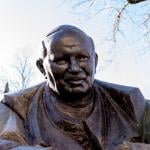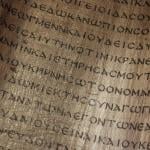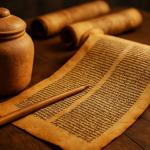KEN ASKS:
What has been the impact on Mormons of the burst of intense attention they received during the Romney presidential bids?
THE RELIGION GUY ANSWERS:
This was posted before Mitt Romney took himself out of the Republicans’ crowded 2016 steeplechase. But this is a good moment to analyze the era when his presidential ambitions brought new attention to the Church of Jesus Christ of Latter-day Saints (nicknamed “Mormon” or “LDS”). Not that he’s disappearing. Romney remains a player and conceivable vice president, Treasury secretary, or other official if the G.O.P. wins next year — unless his church appoints him one of its ruling “General Authorities” in Salt Lake City.
Romney is no run-of-the-mill churchgoer but has held responsible posts in this clergy-less denomination that’s led locally by laymen serving part-time. He has been the “bishop” (equivalent of a pastor) in his own “ward” (congregation) and president of the Boston area “stake” (akin to a Catholic or Episcopal bishop). He is an ordained “high priest,” the LDS ecclesiastical rank below patriarch, seventy, and apostle.
The former governor’s prominence should have burnished the faith’s P.R. image. He personifies attractive virtues Mormons most like to display: clean living, hard work, probity, public spirit (e.g. taking charge to save the 2002 Winter Olympics), generosity in donations and private help, patriotism, and faithful commitment to church and family. Add to that striking success in business, which was central to Democrats’ attacks against Romney but probably didn’t hurt public perceptions of Mormonism.
Back in 1960 the Gallup Poll found 21% of U.S. adults wouldn’t vote for a Catholic as president, even if well qualified. Yet John F. Kennedy just managed to edge Richard Nixon in the popular vote, by 17 hundredths of one percent. Many surveys since show a decline in opposition that is now close to nil for a Catholic, or a Jewish, black, or female president.
As for a Mormon in the White House, that question first arose at the point when Mitt’s father George was emerging as the chief rival to Nixon for the 1968 G.O.P. nomination. Gallup asked whether respondents would vote for a “well-qualified” nominee “who happened to be Mormon” and 17% said no. Since then Gallup has asked that question seven more times with remarkably unchanging results. In 2012, 18% were still saying no, without significant variation among Protestants or Catholics.
Why this segment’s stubborn wariness toward a Mormon? Try this hypothesis: In 2012 one-tenth of Republicans said no to a Mormon compared with a significant one-fourth (24%) of Democrats. That could reflect the importance of non-religious and anti-religious voters in the current Democratic Party coalition. Evangelicals face similar hostility according to some polls — Scott Walker beware — and like Mormons are seen as especially devout. Perhaps with these voters the problem with a Mormon isn’t that he’s Mormon but that he’s too religious.
As Ken says, Romney increased LDS visibility. Yet a Pew Research Center survey in 2012 showed only 60% of adults were even aware he is Mormon and half admitted they were uninformed about that faith (28% knew “not very much” and 21% “nothing at all”).
Another hypothesis involves LDS distinctiveness. Pew found that among those able to identify Romney’s religion 19% were “uncomfortable” with it. Asked whether Mormonism is “very different” from their own religion, 61% said yes it is. On the perennial question of whether the LDS church should be regarded as “Christian,” 50% said yes, 31% said no, and 19% were uncertain. On that discussion, see “Is Mormonism Christian?”, a Q and A item last October 18: www.patheos.com/blogs/religionqanda/2014/10/is-mormonism-christian
During Romney’s two campaigns, few evangelical Protestant leaders of national stature argued against voting for a Mormon on religious grounds, even though the two faiths are major rivals in convert-seeking and doctrine. The one exception who comes to mind, Dallas Baptist Robert Jeffress, calls LDS religion a “theological cult” but ended up favoring Romney over Obama. Of course the evangelical grass roots may have been more hostile. Meanwhile, secular and liberal voices expressed blatant scorn toward Mormon candidates. When Romney spoke about his faith in late 2007 at the George H.W. Bush presidential library, the late atheist Christopher Hitchens trashed the talk as “worthless,” applied the “cult” label, branded LDS founder Joseph Smith Jr. a “fraud” and worse, and maligned “official Mormon racism” (referring to priesthood policy the church abolished 37 years ago).
To more temperate observers, Romney’s speech was one of the most significant treatments of church and state by a major politician since candidate Kennedy’s celebrated speech to the Greater Houston Ministerial Association. Much like Kennedy, Romney pledged that no church authorities would “ever exert influence on presidential decisions,” that no doctrine would trump the “sovereign authority” of the U.S. Constitution and secular law, and that “no religion should dictate to the state.” However, he also opposed those who want religion to be “merely a private affair with no place in public life,” saying that would establish a “new religion” of secularism. Text: http://www.npr.org/templates/story/story.php?storyId=16969460
Incidentally, though Mormons are famously Republican a Democrat is currently the church’s most politically powerful member, in fact the most powerful in U.S. history. That would be Harry Reid, who ran the U.S. Senate from 2007 till Democrats lost control in January, and remains minority leader. With the Republican takeover, Mormon Orrin Hatch, as his party’s senior member, became president pro tempore of the Senate and third in line to the presidency after Vice President Biden and Speaker Boehner.
The Religion Guy adds this: If present growth rates proceed, the LDS church is destined one day to surpass the United Methodist Church as America’s third largest religious body behind the Catholic Church and Southern Baptist Convention. Remarkable progress for what in frontier days was the nation’s most persecuted religion.






